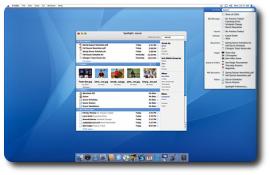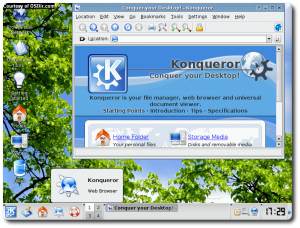 enjoy listening to music, but yet again who doesn’t? There is always catch though — a pitfall if you like: records and files get ‘used up’ after a period of time. Obtaining new music is a time-consuming process whether it involves walking, browsing or loading CD‘s.
enjoy listening to music, but yet again who doesn’t? There is always catch though — a pitfall if you like: records and files get ‘used up’ after a period of time. Obtaining new music is a time-consuming process whether it involves walking, browsing or loading CD‘s.
Since peer-to-peer (P2P)) downloads are illegal, I have been downloading a lot music from small bands’ Web pages en masse. What I do not like, I can immediately dispose of. Using the command line, I am able to download music in the background without any manual intervention, simply by spidering the Internet.
 I have come to realise that I do not know the names of songs that I listen to. I rarely bother to look at the filenames or tags because it is the same time-consuming ‘luxury’ mentioned above. In most cases, I fail to remember the names of bands too. To use an extreme example, a song which I must have listened to 50+ times in past few days has been completely obscure to me up until now. To repeatedly play it, I would typically use the “jump” function followed by the string “
I have come to realise that I do not know the names of songs that I listen to. I rarely bother to look at the filenames or tags because it is the same time-consuming ‘luxury’ mentioned above. In most cases, I fail to remember the names of bands too. To use an extreme example, a song which I must have listened to 50+ times in past few days has been completely obscure to me up until now. To repeatedly play it, I would typically use the “jump” function followed by the string “be” (for the word “belief” contained in the song’s title). This plays the song merely at the power of will, taking no more than a second to find and play it. It all leaves song titles and artists’ names in the dark unfortunately.
While on this issue of ‘music productivity’, XMMS accelerators, for instance, are used to control the music player without changing application focus. In other words, key combinations involving SHIFT, CTRL and/or ALT work universally and affect the player’s state at any time. You can change tracks, adjust volume etc. while in the midst of writing a sentence. The mechanism which enables this is described (also visually) towards the end of an old item about Music Log Files.
I have reached what I consider to be a Utopian situation. This is analogous to have a radio station with infinite supply of music. I have the ability to skip tracks, repeat tracks and organise the music supply at great ease. Moreover, the music supply can be handled purely by robots (cron jobs), as described in an old item on music mass-downloading.
 or those who have not followed the headlines, Apple ditched their IBM processors and made a decision to sidle next to Intel. Since Intel represent a Microsoft monopoly to most (most latterly the DRM outrage), the move resulted in flames, as well as isolated loud voices of support.
or those who have not followed the headlines, Apple ditched their IBM processors and made a decision to sidle next to Intel. Since Intel represent a Microsoft monopoly to most (most latterly the DRM outrage), the move resulted in flames, as well as isolated loud voices of support.





 Filed under:
Filed under: 

 icrosoft have announced that Windows 2000 users are exposed to hijacking.
icrosoft have announced that Windows 2000 users are exposed to hijacking.  oogle have recently revealed that they had used Linux from day one. Looking further into the past, why have they not openly expressed their passion for Linux? Perhaps they realised that over 90% of their target audience were Windows users. No user will be inclined to use the service of one that is different, one whose preferences are in ‘disharmony’ with the clients. Under such circumstances, there emerges an inner-conflict, whereby a Google user admits making a mistake, making a poorer O/S choice.
oogle have recently revealed that they had used Linux from day one. Looking further into the past, why have they not openly expressed their passion for Linux? Perhaps they realised that over 90% of their target audience were Windows users. No user will be inclined to use the service of one that is different, one whose preferences are in ‘disharmony’ with the clients. Under such circumstances, there emerges an inner-conflict, whereby a Google user admits making a mistake, making a poorer O/S choice.
 This move can certainly make Google Alerts for news obsolete, yet such alerts for non-news searches remain practical, albeit difficult to handle (periodical HTML-formatted E-mails).
This move can certainly make Google Alerts for news obsolete, yet such alerts for non-news searches remain practical, albeit difficult to handle (periodical HTML-formatted E-mails). enjoy listening to music, but yet again who doesn’t? There is always catch though — a pitfall if you like: records and files get ‘used up’ after a period of time. Obtaining new music is a time-consuming process whether it involves walking, browsing or loading CD‘s.
enjoy listening to music, but yet again who doesn’t? There is always catch though — a pitfall if you like: records and files get ‘used up’ after a period of time. Obtaining new music is a time-consuming process whether it involves walking, browsing or loading CD‘s. I have come to realise that I do not know the names of songs that I listen to. I rarely bother to look at the filenames or tags because it is the same time-consuming ‘luxury’ mentioned above. In most cases, I fail to remember the names of bands too. To use an extreme example, a song which I must have listened to 50+ times in past few days has been completely obscure to me up until now. To repeatedly play it, I would typically use the “jump” function followed by the string “
I have come to realise that I do not know the names of songs that I listen to. I rarely bother to look at the filenames or tags because it is the same time-consuming ‘luxury’ mentioned above. In most cases, I fail to remember the names of bands too. To use an extreme example, a song which I must have listened to 50+ times in past few days has been completely obscure to me up until now. To repeatedly play it, I would typically use the “jump” function followed by the string “ SD is the Berkeley System / Software Distribution, which is a popular variant/branch of UNIX. It has already reached the average home computer several times in the past, as opposed to being used in machine rooms (e.g. data centres, computational servers). DesktopBSD 1.0 is a new endeavour (yet another distribution), currently at a release candidate phase. It was brought to many people’s attention via Slashdot.
SD is the Berkeley System / Software Distribution, which is a popular variant/branch of UNIX. It has already reached the average home computer several times in the past, as opposed to being used in machine rooms (e.g. data centres, computational servers). DesktopBSD 1.0 is a new endeavour (yet another distribution), currently at a release candidate phase. It was brought to many people’s attention via Slashdot.

